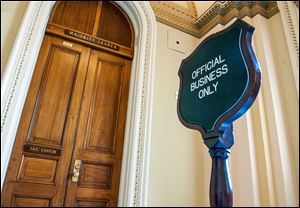
MIDNIGHT DEADLINE
Capitol remains quiet with shutdown looming
Senate meets today; officials swap blame
9/30/2013
The sun rises behind the White House on Sunday morning as the debate continues over implementation of the nation's health-care law requiring insurance exchanges.
ASSOCIATED PRESS

The sun rises behind the White House on Sunday morning as the debate continues over implementation of the nation's health-care law requiring insurance exchanges.
WASHINGTON — With a deadline to avert a federal government shutdown approaching, the U.S. Capitol was eerily quiet on Sunday as Republicans and Democrats waited for the other side to blink first and break the impasse over funding.

If a spending bill for the new fiscal year is not passed today, government agencies and programs deemed nonessential will close.
The Republican-controlled House of Representatives early on Sunday passed a measure that ties government funding to a one-year delay of President Obama’s health-care law.
Rep. Marcy Kaptur (D., Toledo) voted against it while Reps. Bob Latta (R., Bowling Green) and Jim Jordan (R., Urbana) voted in favor. Michigan Rep. Tim Walberg (R., Tipton) also voted in favor.
Senate Democrats have vowed to quash it.
If a spending bill for the new fiscal year is not passed by 11:59 p.m. today, government agencies and programs deemed nonessential will begin closing their doors for the first time in 17 years.
In a sign that lawmakers increasingly view that as inevitable, the House unanimously approved a bill to ensure that U.S. soldiers would be paid no matter what happened.
The high-stakes chess match in Congress will resume today when the Democrat-controlled Senate reconvenes at 2 p.m.
Senate Democrats will then attempt to strip two Republican amendments from the spending bill: the one that delays the 2010 health-care law known as Obamacare and another to repeal a medical device tax that would help pay for the program.
They would then send a bill with a simple extension of government spending back to the House, putting the legislative hot potato back in House Speaker John Boehner’s lap as the shutdown looms.
“Tomorrow, the Senate will do exactly what we said we would do and reject these measures,” said Adam Jentleson, a spokesman for Senate Majority Leader Harry Reid (R., Nev.).
“At that point, Republicans will be faced with the same choice they have always faced: Put the Senate’s clean funding bill on the floor and let it pass with bipartisan votes, or force a Republican government shutdown.”
The funding standoff is a harbinger of the next big political battle: a far-more consequential bill to raise the federal government’s borrowing authority.
Failure to raise the $16.7 trillion debt ceiling by mid-October would force the United States to default on some payment obligations — an event that could cripple its economy and send shock waves around the globe.
Yet neither side wants to be the one to cast the final vote that would lead to a shutdown.
Polls consistently show the American public is tired of political showdowns and opposed to a shutdown.
There were no signs from Congress or the White House of last-minute negotiations to resolve the standoff.
Instead, Democrats and Republicans spent their energies trying to pin blame on the other side for failing to avoid a calamity.
Action in Washington was limited mainly to the Sunday talk shows and a barrage of news releases as Democrats and Republicans rehearsed arguments for blaming each other if the government does close its doors.
“You’re going to shut down the government if you can’t prevent millions of Americans from getting affordable care,” said Rep. Chris Van Hollen (D., Md.).
“The House has twice now voted to keep the government open. And if we have a shutdown, it will only be because when the Senate comes back, Harry Reid says, ‘I refuse even to talk,’ ” said Sen. Ted Cruz (R., Texas), who led a 21-hour broadside against allowing the temporary funding bill to advance if stripped clean of a tea party-backed provision to derail Obamacare.
The effort ultimately failed.
No lawmakers were in or around the Capitol on Sunday until late afternoon, when 16 House Republican members held a news conference on the Senate steps to call on Mr. Reid to pass the funding and “Obamacare” delay measure.
“I personally believe that Senator Reid and the President, for political purposes, want to shut down the government. It’s a scorched-earth policy,” said Rep. Tim Griffin (R., Ark.).
Sen. Charles Schumer (D., N.Y.) shot back that the Republican tactics were a “subterfuge” to avoid blame for a shutdown.
“So instead of continued game-playing, we urge Speaker Boehner to reconvene the House, pass a clean [continuing resolution], and move on,” he said.
Mr. Boehner and Mr. Reid have taken a low profile as the deadline draws closer.
“If the Senate stalls until Monday afternoon instead of working today, it would be an act of breathtaking arrogance by the Senate Democratic leadership,” Mr. Boehner said. “They will be deliberately bringing the nation to the brink of a government shutdown.”
Rep. Kevin McCarthy (R., Calif.) said if the Senate stripped the funding bill of the “Obamacare” provisions, House Republicans would return it with other changes to the health-care law. “It will be additions that Senate Democrats said they can support,” Mr. McCarthy told Fox News Sunday, without specifying these “other options.”
A leading Senate GOP moderate called on her fellow Republicans to back down.
“I disagree with the strategy of linking Obamacare with the continuing functioning of government — a strategy that cannot possibly work,” said Sen. Susan Collins (R., Maine).
Mr. Obama has threatened to veto any bill that delays his health-care program.
The funding impasse is the culmination of more than three years of failed conservative efforts to repeal “Obamacare,” a program aimed at extending health insurance to millions of those without coverage.
Republicans argue that the health-care law, key parts of which are scheduled to take effect on Tuesday, is a massive and unnecessary government intrusion into medicine that will cause premiums to skyrocket and damage the economy.
And if the battle over “Obamacare” pushes up to the mid-October deadline to raise the debt ceiling, U.S. stocks may suffer.
When gridlock threatened a debt default in 2011, the Dow Jones industrials fell about 2,100 points from July 21 to Aug. 9, with the market needing two more months to regain its footing.
The current timetable could leave Mr. Boehner with the most difficult decision of his career: whether to approve a clean continuing resolution the Senate will likely send it today or allow the government to shut down for the first time since late 1995.
The last government shutdown ran from Dec. 16, 1995, to Jan. 6, 1996, and was the product of a budget battle between Democratic President Bill Clinton and Republicans, led by then-Speaker Newt Gingrich.
Republicans suffered a public backlash when voters re-elected Mr. Clinton in a landslide the following November.